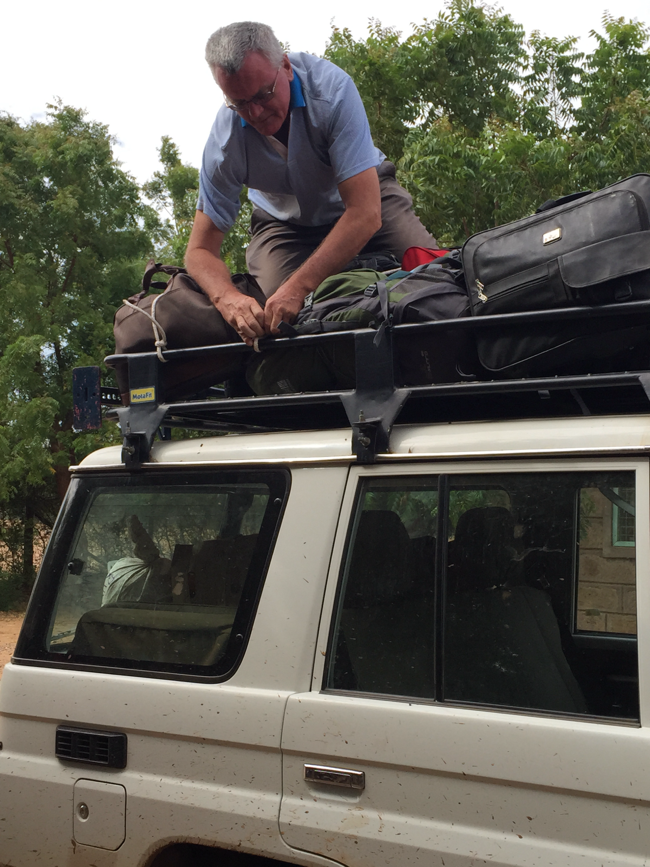Its been a while….
But South Sudan has never been far from my thoughts. I keep in contact with my friends there and I try to do what I can from a distance. Sometimes South Sudan feels very close, sometimes like I don’t know it at all.
Fr. Tim is still, of course, a huge part of my life and he agreed to marry me to Stuart in the pouring rain on Our Lady of the Rocks in Montenegro in 2018. Of course, our wedding was special but the fact that it was celebrated by someone who means so much to me was truly wonderful.
Those of you who followed my first two adventures in South Sudan and who supported me with lovely emails and messages while I was there and almost more importantly, messages of encouragement when I returned to London know what we have already achieved.

In 2013, I left Narus in South Sudan having taught maths in St. Bakhita Primary School. A few weeks after I left, the war broke out and parents sent their children to the school in the hope that they would be safe from the fighting that would come. The people in this part of South Sudan have lived through decades of war but it is an unwritten rule, seldom broken, that the two schools, St. Bakhita and St. Daniel Comboni are safe havens for the children.
Children arrived in such numbers that the UN provided temporary shelters almost 100 young girls lived in these canvas structures. It was an acceptable solution for the very short term but the children were not safe. When Fr. Tim told me in January 2014, I asked my friends to rally….and rally you did. A new dormitory was constructed in the following months and it is now home to 75 girls who attend St. Bakhita Primary School. They are safe, they have access to food and education. A job well done I would say.
In 2015, I returned to South Sudan but this time to Riwoto where Fr. Tim had been asked to continue the work on the primary school there. Kapoeta was a centre of fighting during the war as it is a garrison town and Riwoto is a satellite village of Kapoeta on the other side of the dry bed of the Singaita river. This time, my trip was very different. The hope that I had experienced in 2013, hope that peace and autonomy brings was gone. People were once again dealing with the awful consequences of war; the currency was practically worthless, the crops had failed and people were hungry.
I taught in the primary school which was still in its foundation years. At that time, there were only 4 classes. 5 years later, there is a full primary school programme and an over-subscribed kindergarten school.
So, it’s time for me to call on my friends again.
Fr. Tim has just launched a local campaign in Kerry to raise funds to build the secondary school and I’d like you to help. There’s nothing in it for you…you will probably never take the 3-day journey to visit the school, if a building is named in your honour you will probably never see it. It’s unlikely you will ever meet any of the children who benefit.
But what I can tell you is that this work is needed. It is needed in this place because these people have nothing more than education. I have seen first-hand, and shared my stories, about how education offers some prospects to the children, how my students from St. Bakhita have already gone on to study nursing and teaching, how they have returned to South Sudan to do their part.
Yeats said that education is not the filling of a pail but the lighting of a fire. I’ve written about the fire I saw in the girls of St. Bakhita in Narus and in St. Mary Magdalen in Riwoto and how proud I was to do my small part to tend to that fire. Having the opportunity to participate in the education of these children was singularly the luckiest thing that has ever happened to me. And I do not underestimate the impact it had…. on them and on me.

I know it has been a rubbish year for so many. 2020 did not turn out as any of us thought it would but wouldn’t it pretty awesome, if by the end of 2020 we had secured the funds to do this good thing in a place you’ll never go to for people you will never meet. This is how I’m choosing to close out 2020…with something good.
So, you know the drill…click the link below and have your debit card ready xxx
Here’s a video from Tim describing Riwoto and the work that he does…enjoy….
















